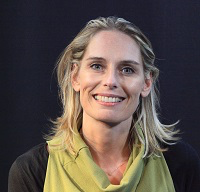Prof. Dr. Aurélie Laborde, Université Bordeaux Montaigne, will provide an overview on research and education in the field of organizational communication in France. She will outline the position of our field within information and communication sciences in France. Drawing on the articles published in "Communication & Organization", the only French-language journal in the field, she will highlight the main topics, theoretical underpinnings, and methodological approaches currently being used and developed in France. She will also provide some information on academic education in organizational communication in France. Finally, she will present the main results of a research program that she has just completed on the topic of cyber-incivility in the workplace, as well as some considerations arising from her habilitation for conducting research on ordinary digital violence in organizations - focusing on the dark side of organizational communication.
About our guest speaker:
Aurélie Laborde is head of the Organisational Communication section at the Institut des Sciences de l'Information et de la Communication, University of Bordeaux Montaigne, France. The university brings together more than 14,000 students and 1,300 teaching and administrative staff, for study and research in the arts, languages, literatures and human and social sciences. Aurélie Laborde is in charge of the master program "Organisational Communication: Strategy and Consultancy“. She is also in charge of the COS research team (Communication, Organisation and Society) at the MICA laboratory (EA 4426 Mediations, Information, Communication, Arts), and member of the Org & Co network, the national study and research group on organizational communication. Since 2017, she is the editor of the academic journal Communication & Organisation since 2017, which celebrated its thirtieth anniversary this year.
Her research is structured around a common theme: the social and organizational changes associated with digital innovation. It is based on a critical perspective that links these transformations with social changes marked by neo-liberal thinking. Her latest research program on transformations in forms of civility at work (Civilinum) fits into this framework, as does her habilitation entitled 'Ordinary digital violence and discreet resistance: the dark side of organisational communications‘.
Aurélie Laborde has also been involved in participatory research bringing together professionals and researchers, in order to raise awareness, bring to light and reveal phenomena that are largely unknown or kept quiet in organizations, and to collectively decipher organizational malfunctions as close as possible to the practices of those involved. She is currently involved in two research programs: COMPAST (Comparative Study of Contemporary Ethical Issues in Occupational Health), which brings together a number of laboratories and public and private partners in several European countries and North America, and BEST, a project on Factories of the Future, which addresses questions on the imaginary world of the factories of the future and communication strategies on this subject. She has recently joined the international research team for the next phase of the ECM (European Communication Monitor) project. Researchers from universities in Leipzig, Leeds, Madrid, Milan, Oslo, and Bordeaux collaborate in this project to identify practices and trends in corporate communications across Europe.
